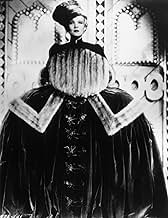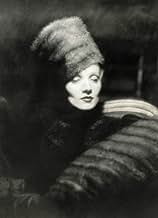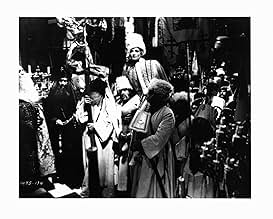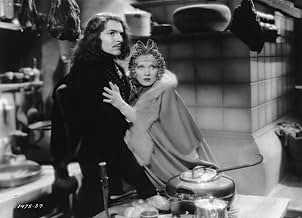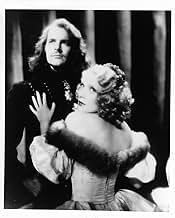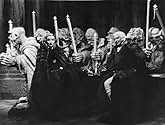Uma nobre alemã entra em um casamento sem amor com o herdeiro estúpido e instável do trono russo, então conspira para tirá-lo do poder.Uma nobre alemã entra em um casamento sem amor com o herdeiro estúpido e instável do trono russo, então conspira para tirá-lo do poder.Uma nobre alemã entra em um casamento sem amor com o herdeiro estúpido e instável do trono russo, então conspira para tirá-lo do poder.
- Direção
- Roteiristas
- Artistas
- Prêmios
- 1 vitória no total
- Count Lestoq
- (as Phillip Sleeman)
- Ivan Shuvolov
- (as Hans von Twardowski)
- Sophia as a Child
- (as Maria)
- Lackey #5
- (não creditado)
- Count von Breummer
- (não creditado)
- Sophia's Aunt
- (não creditado)
- Direção
- Roteiristas
- Elenco e equipe completos
- Produção, bilheteria e muito mais no IMDbPro
Avaliações em destaque
During the entire picture, what stood out were the amazing sets. The film begins with some very graphic torture chamber scenes that are definitely "Pre-Code" in that they are so frightening and because of the copious amounts of gratuitous female nudity. While this never could have been allowed once the stronger Production Code was implemented around 1935, it is a captivating and bizarre introduction to the movie and it certainly got your attention!! Then, throughout the film, the sets were magnificent and very twisted--almost like they had been inspired by a combination of LSD, Jean Cocteau's version of BEAUTY AND THE BEAST and the paintings of Hieronymous Bosch! Twisted and grotesque anthropomorphic statues, banisters, candelabras, chairs, etc. grace practically every scene inside the palace--making it look like a combination of Hell and whimsy!! You really just have to see it all to believe it. What was also amazing was how Paramount was able to construct all this without the production bankrupting the company!!! While the dialog and acting is fine, they take a definite backseat to the sets. It's very obvious that Von Sternberg really wasn't trying to humanize the characters or shed too much light on the life of Catherine--it was really more of a work of performance art. And if you accept it as this and NOT an absolutely true recounting of the life of Catherine, then you will be in for a treat.
As for the historical side of the film, there has long been some disagreement about the coup and subsequent execution of Catherine's husband. While it is almost undoubtedly true she orchestrated it (after all, they made her their leader after Peter's death), what isn't so certain is the character of Peter. Some accounts have described him as half-witted or insane (exactly how he's shown in the film) but others doubt if this was exactly the case--it could have just been propaganda used by Catherine to justify her actions. Plus, when Peter died, some apparently reported this was of natural causes and not murder! Considering everything, though, the film had to portray Peter III some way and the evil half-wit was an enjoyable choice--as Sam Jaffe looked so crazed and made the part come alive with his insane-looking eyes and wonderful delivery! Dietrich herself was also very good (perhaps due to her not being so "artificial-looking" like she was in some of her other films due to excessive makeup), but her performance was definitely overshadowed by the sets and Jaffe
By the way, I originally gave this film a very respectable score of 8. However, after seeing "The Rise of Catherine the Great" (which was made the exact same year and covered the exact same material), I saw that this Dietrich film was a lot better by comparison. I especially think that Dietrich and Jaffe were a much better Peter and Catherine than Elisabeth Bergner and Douglas Fairbanks, Jr. in the other film.
A riotous feast for the eyes, this is one of the great, unheralded films of the 1930's - enthralling for its visual impact alone. Seldom has an American film been filled with such lush imagery - tactile, grotesque, fascinating. The Russian royal palace is a charnel house full of ghouls & gargoyles - human & artistic. The actors share the scenes with fantastic statuary, twisting & writhing in silent, unspeakable pain. (Notice the tiny skeletons on the dining table.) Everywhere is death, moral decay & barbarism, even in the most powerful court in Europe.
At the center of this ossuary is the gorgeous Marlene Dietrich. Her beauty radiates, but never dominates, throughout the film. She is splendid as a young woman in a very dangerous place, who gains courage & great determination in her ordeal. Equally good is Sam Jaffe as Peter; with his leering grin & demented eyes he is the very picture of a murderous madman.
Louise Dresser, as the Empress Elizabeth, is very effective as a comic bully. John Lodge & Gavin Gordon, as Catherine's military lovers, are both stalwart. Wonderful old Sir C. Aubrey Smith has a small role as Catherine's princely father. Film mavens will spot an uncredited Jane Darwell as Catherine's nurse.
The highly emotional soundtrack, an amalgam of themes by Tchaikovsky, Mendelssohn & Wagner, explodes in the film's final moments into musical pyrotechnics.
The whole of the Russian court turns out to be not much different from the vile stories of atrocity she was narrated to as a child, one after another a series of machinations at the hands of the half-mad.
But of course history was never the purpose for Sternberg, these stories at the beginning of the film he visualizes in the manner of pages from a book. So a fiction malformed from history, a book of images, ostensibly based on the diaries of the real person, in turn a history malformed from the real thing, with Dietrich stage center, shining, radiant.
It was always Dietrich that validated film for Sternberg, the image of seductive beauty that could seduce beauty from the camera. But in several ways, I feel that Sternberg deteriorated upon joining up with her much like the hapless professor in Blue Angel. His art was tortured before, anguished with emotion, but since Dietrich it seemed to be solely consumed by her at the expense of all else.
Nowhere is this more evident than here, no pretense about it anymore. Dietrich is quite literally queen, destined to be, and the whole thing around her merely provides the tortured circumstances for the scene of triumph.
There is so much cacophony when she does finally triumph that it makes you think Sternberg has finally gone unhinged from so much pained adoration, that he doesn't quite know when to separate one feverish fantasy from his own. A cavalcade storms inside the palace and up the expansive staircase, a bell rings, ringing bells across the country, crowds rejoice, that were earlier silently praying, and Dietrich is finally ushered on shoulders into the church swarmed with banners on all sides to be crowned empress. Ride of the Valkyries clangs away in bombast for the duration.
But this is the thing that strikes the most vividly, the crowning luxurious decadence of the whole enterprise. Even in the grip of what seems like lovestruck paroxysm, Sternberg could envision farther than most at the time. And when he failed, he failed more spectacularly than anyone could, in the most interesting ways to see.
It baffles. It exhilarates with the sheer monstrosity of the caricature. It overwhelms any sensibility that is fine, any sense of good taste. You will never see more a outrageous depiction of an Orthodox church ever, the frescoes of saints bordering on a surreal that is blasphemous. Or more styrofoam gargoyles in one studio lot palace.
So the frame is overflowing with anguished, fiendish luxury; but everything that is grossly portrayed here, was actually taking place on that studio lot. Whatever was going on in 18th century Russia, at least this thing was actually happening in Hollywood, that would go to such lengths to envision and stage such a dazzling darkness. A cavalcade was made to storm up a staircase. And there was this woman at the center, flickering before the camera like the flame of the candle she holds at one scene, finally lighting up the place.
So it is apt to recast the whole thing as Dietrich's journey, mirrored from the other, from her faraway home into the court of a foreign country, with every spotlight on her, every male pair of eyes.
The first part is sourced out as a kind of Alice in Wonderland; the girl enters a strange world, apprehensive, fearful, a world that would reduce her to size, where she must fit through doors too big, wait for the queen or lose her head, finally descend into a rabbit hole and come out the other end the mother of a heir.
But in the second part she becomes the Dietrich we know and have come to see conquer with fierce beauty, the Lola that first broke hearts in Blue Angel; the whole film around her transforms into the restless dream that men were dreaming about her. The idea is that she becomes that dream, operating the image from inside.
It is not a good film all else considered, the overcooked bombast, the intertitles that never shy away from revealing the full implications of the most obvious detail, but it's a mess you should see, just for how madly passionate.
In the first half Marlene Dietrich in the title role overplays breathless awe so emphatically that one can only wonder if she was strictly directed to do so; after her sexual awakening after months of resisting the stirring of her passions by a rakish courtier (John Lodge) and crazed with frustration by her unconsummated marriage to the repellent Tsar-to-be Peter (Sam Jaffe), she melts into the arms of a palace guard during a sudden moonlit encounter.
It's hard to believe this film passed the 1934 censors, given its open suggestions of out-of-wedlock sex (and subsequent pregnancy); Dietrich's posturings call to mind pre-Code Mae West (who was a friendly acquaintance of Dietrich's on the Paramount lot where they were working at the same time). Perhaps the keepers of the Code were too distracted by the shimmering vision of the blonde icon as lit by Josef von Sternberg. And make no mistake about it, this movie is a paean to Dietrich as a work of art. The "Catherine the Great" plot, scenic design and supporting players are the scaffolding and trappings supporting and surrounding the living goddess.
These trappings are highly stylized and elaborate as, for example, the Lubitsch-like ritual of Princess Sophia (the future Empress Catherine) kissing the hands of all adults present whenever she enters or exits a room; when she isn't engaged in strictly supervised activities she is kept locked in her bedroom several flights above the main floor of her house; her mother is such a disciplinarian that she scolds the child even when the child obeys. Empress Elizabeth of Russia (Louise Dresser) is introduced on a grand throne in forbidding surroundings decorated with huge grimacing gargoyles festooned with dripping candles and attended by over-dressed lackeys, only to open her mouth and jabber like a bilious small-minded housewife. And the future Tsar Peter whom Sophia is sent to Russia to marry is an imbecile and described as such repeatedly in intertitles in case we miss the point.
In fact the flow of exaggerations and extremes is more or less constant so that the viewer is alternately hypnotized and amused. If Dietrich is not your cup of tea, the movie will repel you, because it's all about her.
Você sabia?
- CuriosidadesMarlene Dietrich's own daughter Maria Riva portrayed young Sophia at the beginning of the film and it was her debut in movies.
- Erros de gravaçãoMost of the action takes place at The Kremlin in Moscow. The historical Empress Elizabeth, Grand Duke Peter and later Catherine spent most of their reigns in St. Petersburg, which during the 18th Century was a modern, Europeanized city.
- Citações
Grand Duke Peter: Why are those bells ringing?
[He opens the bedroom door and addresses a man in the hall]
Grand Duke Peter: Why are those bells ringing?
Capt. Gregori Orloff: I don't know, Peter.
Grand Duke Peter: How dare you address me like that! Who are you?
Capt. Gregori Orloff: My name is Orloff, and I'm on duty as guard.
Grand Duke Peter: I'll have your head for this insolence! You're addressing the emperor!
Capt. Gregori Orloff: There is no emperor. There is only an empress.
- ConexõesEdited from Alta Traição (1928)
- Trilhas sonorasSymphony No.4 in F Minor, Op.36
Written by Pyotr Ilyich Tchaikovsky
Excerpts played during the opening credits and incorporated into the score often
Principais escolhas
- How long is The Scarlet Empress?Fornecido pela Alexa
Detalhes
- Data de lançamento
- País de origem
- Idioma
- Também conhecido como
- A Imperatriz Galante
- Locações de filme
- Empresa de produção
- Consulte mais créditos da empresa na IMDbPro
Bilheteria
- Orçamento
- US$ 900.000 (estimativa)
- Faturamento bruto mundial
- US$ 3.353
- Tempo de duração
- 1 h 44 min(104 min)
- Cor
- Proporção
- 1.37 : 1


